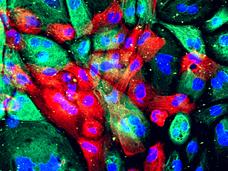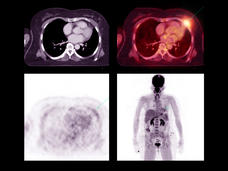Prognosis - Cancer Currents Blog
Reports on cancer prognosis-related research, including articles on doctor–patient communication and approaches to determine patient prognosis more accurately, among others.
-
Will This Cancer Metastasize? Check Its “Stickiness”
A device that measures the “stickiness” of cancer cells in tumor samples may help predict the likelihood of a patient’s cancer metastasizing. Researchers believe the device could eventually help doctors make more informed treatment choices.
-
Can AI Help Predict Which Cancer Patients Should Be Treated with Immunotherapy?
An AI-based tool called SCORPIO more accurately predicted whether cancer patients’ tumors would respond to checkpoint inhibitors than currently available tests, a new study found. It also predicted how long patients would live after treatment.
-
Screening People at High Risk for Pancreatic Cancer May Help Them Live Longer
Regular imaging tests to monitor the pancreas may help detect pancreatic cancer at an early stage in people who are at high risk, a new study suggests. This type of surveillance could also help improve how long these patients live.
-
Loss of Y Chromosome in Men Makes Bladder Cancer More Aggressive
In men, loss of the Y chromosome in bladder cancer cells helped tumors evade the immune system and grow unchecked, a new study shows. However, losing the chromosome also appears to make bladder cancer more susceptible to immunotherapy, researchers reported.
-
Liquid Biopsies on the Horizon for Children with Solid Cancers
Results from a new study highlight the progress being made toward developing liquid biopsies specifically for use in children with solid cancers like Ewing sarcoma and Wilms tumor. The tests can help detect and diagnose cancer and monitor for response to treatment and recurrence.
-
Is a Genomic Test Better at Finding Aggressive Prostate Cancer?
The Decipher genomic test found high-risk prostate cancer even when conventional tests said the tumors were lower risk. This discrepancy appeared to happen more frequently for African-American men.
-
Can Artificial Intelligence Help See Cancer in New, and Better, Ways?
Researchers have been developing artificial intelligence (AI) tools that could make cancer imaging faster, more accurate, and more informative. But there are also questions about whether these tools are ready for doctors’ offices, whether they will actually help people, and whether that benefit will reach all—or only some—patients.
-
Test Detects Early Signs of Remaining Cancer in Kids Treated for Medulloblastoma
A new test could potentially be used to identify children treated for medulloblastoma who are at high risk of their cancer returning. The test detects evidence of remaining cancer in DNA shed from medulloblastoma tumor cells into cerebrospinal fluid.
-
Quitting Smoking Improves Survival in People with Lung Cancer
Quitting smoking after a diagnosis of early-stage lung cancer may help people live longer, a new study finds. The study, which included more than 500 patients, also found that quitting smoking delayed the cancer from returning or getting worse.
-
Whole-Genome Sequencing Could Help Guide AML Treatment
For people with acute myeloid leukemia and related cancers, a new study shows whole-genome sequencing could replace a series of conventional tests used to help guide decisions about treatment.
-
After a Breast Cancer Diagnosis, Men May Be More Likely to Die than Women
Men with breast cancer may be more likely to die of the disease than women, particularly during the first 5 years after diagnosis, a new study suggests. The higher likelihood of death was linked in part to undertreatment and later diagnosis.
-
Glioblastoma Study Highlights Sex Differences in Brain Cancer
Men and women with glioblastoma appear to respond differently to standard treatment. A new study identifies biological factors that might contribute to this sex difference.
-
African American Men More Likely to Die from Low-Grade Prostate Cancer
For African American men, the risk of dying from low-grade prostate cancer is double that of men of other races, a new study has found. But, despite the increase, the risk is still small.
-
Using Artificial Intelligence to Classify Lung Cancer Types, Predict Mutations
Cancer researchers have trained a computer program to scan images of tissue samples to differentiate normal lung tissue from the two most common forms of lung cancer. The program also learned to detect cancer-related genetic mutations in the samples.
-
Moving Beyond BMI: Low Muscle Mass May Affect Cancer Survival
Researchers compared the risk of death for women with breast cancer who had low skeletal muscle mass, or sarcopenia, at the time of their cancer diagnosis and women who had adequate muscle mass.
-
Chromosomal Instability Score May Predict Response to Cancer Treatment
A new study suggests that a chromosomal instability score may help guide treatment choices for patients with cancer.
-
Prognosis Discussions Improve Understanding of Illness for Patients with Terminal Cancer
Many patients with advanced, incurable cancer have a poor understanding of their prognosis or life expectancy, a new study shows. Patients who discussed their prognosis with their doctors were more likely to understand the serious nature of their illness.
-
Colorectal Cancer Survival Linked to Primary Tumor Location
A blog post on a study showing that in patients with metastatic colorectal cancer, the location in the colon where the tumor originated appears to strongly influence how long patients live.
-
Patients with Advanced Cancer May Benefit from Discussing Prognosis with Physicians
Patients with advanced cancer may benefit from having discussions about their prognoses with their physicians.
-
Test May Identify Poor Prognosis for Some Patients with Lung Cancer
A panel of three genetic markers may help to identify patients with early-stage lung cancer who have a very strong likelihood of their disease returning after surgery.


















